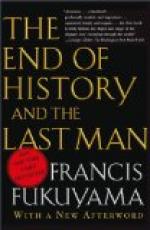|
This section contains 1,431 words (approx. 5 pages at 300 words per page) |

|
SOURCE: “History Over, World Goes On,” in New York Times Book Review, January 26, 1992, pp. 14-5.
In the following review, McNeill approves of Fukuyama's serious concerns though dismisses The End of History and the Last Man as “silly” and “reactionary.”
“Back to Hegel” is not a rallying cry many Americans are likely to find plausible, yet this is what Francis Fukuyama advocates in this quixotic and tightly argued work of political philosophy. Actually, Mr. Fukuyama—a consultant at RAND and the former State Department official who caused a stir three years ago with his essay “The End of History?”—does not really recommend Hegel, but an interpretation of Hegel by a French intellectual named Alexandre Kojève (to me, entirely unknown), who explained in 1947 that History with a capital “H” had reached its logical end with the emergence of liberal democracy. In The End of History and the Last...
|
This section contains 1,431 words (approx. 5 pages at 300 words per page) |

|


